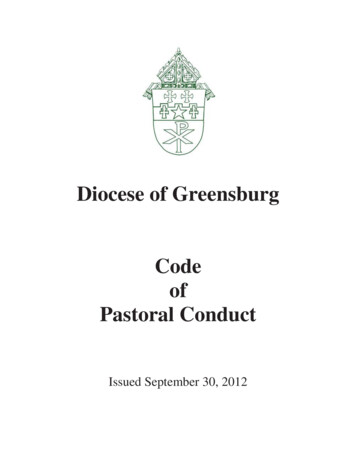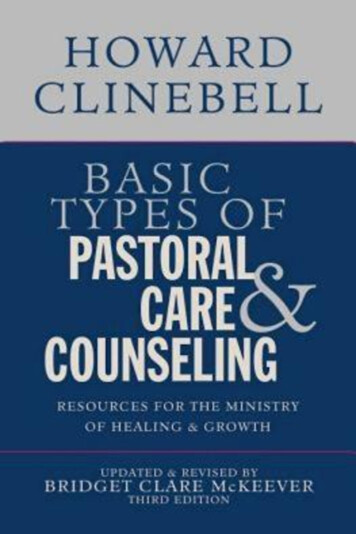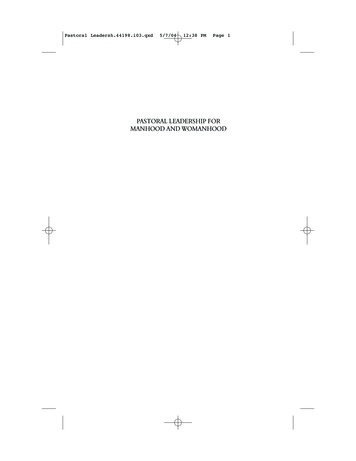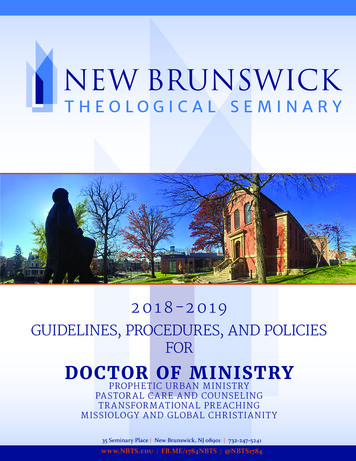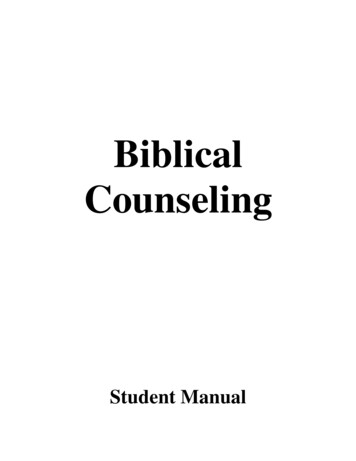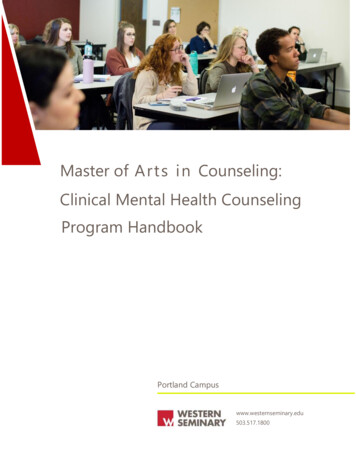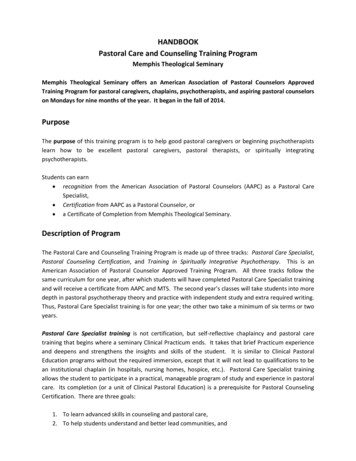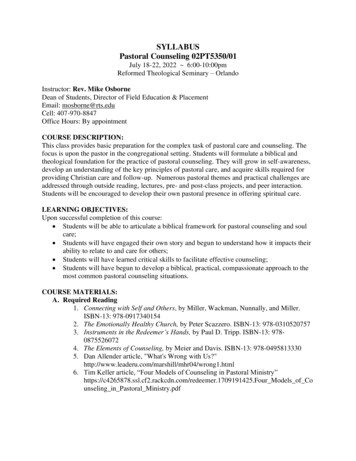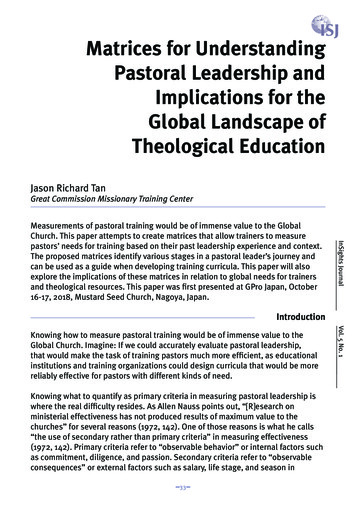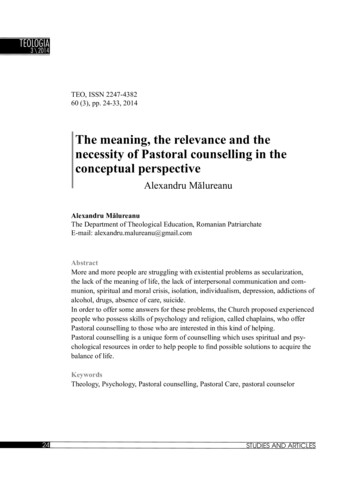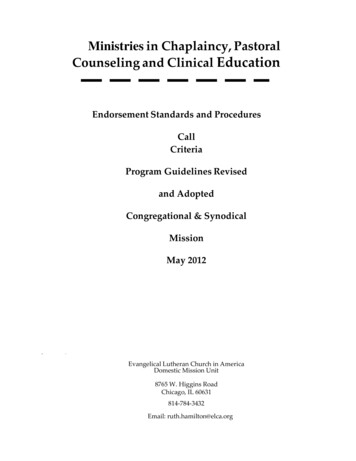
Transcription
Ministries in Chaplaincy, PastoralCounseling and Clinical EducationEndorsement Standards and ProceduresCallCriteriaProgram Guidelines Revisedand AdoptedCongregational & SynodicalMissionMay 2012Evangelical Lutheran Church in AmericaDomestic Mission Unit8765 W. Higgins RoadChicago, IL 60631814-784-3432Email: ruth.hamilton@elca.org
Table of ContentsINTRODUCTION . 3A. OVERVIEW . 3B. CHAPLAINCY, PASTORAL COUNSELING, AND CLINICAL EDUCATION . 3C. PURPOSE . 4I. ECCLESIASTICAL ENDORSEMENT: DEFINITION, ROLES, CORE STANDARDSAND PROCEDURES . 5A. DEFINITION OF ECCLESIASTICAL ENDORSEMENT . 51. Limits of Ecclesiastical Endorsement . 5B. ROLES AND RESPONSIBILITIES: A PARTNERSHIP PROCESS . 51. Role of the Area MCPCCE Consultation Committee. 62. Role of the ELCA Synod . 63. Role of the MCPCCE Office . 7C. ECCLESIASTICAL ENDORSEMENT - CORE STANDARDS . 81. Standard A - Rostering. 82. Standard B - Congregational Service . 83. Standard C – Synod . 84. Standard D - Education Preparation . 85. Standard E – Professional Certification/Credentialing . 96. Standard F - Required Written Materials . 97. Standard G - Ministerial and Theological Competence . 10D. STEPS IN THE PROCESS OF OBTAINING ECCLESIASTICAL ENDORSEMENT . 11E. PROFESSIONAL CERTIFICATION/CREDENTIALING REQUIREMENT. 121. Forwarding of Ecclesiastical Endorsement . 132. Continuation and Review of Ecclesiastical Endorsement . 133. Termination of Ecclesiastical Endorsement. 13II. STANDARDS AND CRITERIA FOR ECCLESIASTICAL ENDORSEMENT FOR MINISTRIES INCHAPLAINCY, PASTORAL COUNSELING AND CLINICAL EDUCATION . 14A. MINISTRY IN CHAPLAINCY . 141. Description. 142. Specific Criteria and Standards . 14B. MINISTRY IN PASTORAL COUNSELING . 151. Description. 152. Specific Criteria and Standards . 15C. MINISTRY IN CLINICAL EDUCATION . 161. Description. 162. Specific Criteria and Standards . 16III. CRITERIA AND PROCEDURES FOR CALL . 17A. CRITERIA . 171. Criteria A: Concept of Ministry . 172. Criteria B: Program of Ministry . 173. Criteria C: Ministerial Functions . 174. Criteria D: Relationship with the Church. 175. Criteria E: Ministry Provisions . 186. Criteria F: Ministry Accountability . 187. Criteria G: Ministry Support Plan . 198. Criteria H: Individual Qualifications . 191
B. PROCEDURES. 191. For Call. 192. For Employment. 203. For Termination of Employment . 21IV. PROGRAM GUIDELINES FOR CHURCH-RELATED ORGANIZATIONS . 22A. ROLE OF PASTORAL CARE . 22B. PASTORAL CARE DEPARTMENT OR PROGRAM . 22C. PASTORAL SERVICES. 23D. QUALITY ASSURANCE . 24ADDENDUM I: CRITERIA FOR EVALUATING EDUCATIONAL PREPARATION FORECCLESIASTICAL ENDORSEMENT. 25A. CATEGORY 1: SUPERVISED PASTORAL CARE AND COUNSELING PRACTICUMS . 25B. CATEGORY 2: FORMAL EDUCATIONAL EVENTS . 25C. CATEGORY 3: OTHER EDUCATIONAL MEANS . 25D. DOCUMENTATION . 25E. PROCEDURES . 25ADDENDUM II: CRITERIA AND PROCEDURES FOR CONTINUATION AND REVIEW OFECCLESIASTICAL ENDORSEMENT. 27ADDENDUM III: CRITERIA AND PROCEDURES FOR REINSTATEMENT OF ECCLESIASTICALENDORSEMENT.28ADDENDUM IV: CRITERIA FOR SELECTION OF CONVENERS FOR AREA MCPCCE CONSULTATIONCOMMITTEES .29ADDENDUM V: APPEALING A CONSULTATION COMMITTEE RECOMMENDATION. 302
Ministries in Chaplaincy, Pastoral Counseling and Clinical EducationEcclesiastical Endorsement ManualINTRODUCTIONA. OverviewThis document outlines the process and procedures for ecclesiastical endorsement for ministries inchaplaincy, pastoral counseling, and clinical education, by which the ELCA affirms and recognizesindividuals who attain the necessary levels of theological and ministerial competence. It sets forthcriteria for the extension of calls and appointments to ministries in chaplaincy, pastoral counseling,and clinical education, hereafter referred to as MCPCCE. Additionally, it presents guidelines forMCPCCE programs in affiliated or recognized social ministry organizations.B. Chaplaincy, Pastoral Counseling, and Clinical Education“Rejoice with those who rejoice;weep with those who weep.” (Romans 12:15)Ministries in chaplaincy, pastoral counseling, and clinical education reach directly into the primarysocial structures and institutions of our world. As they encounter people in the midst of theseeveryday settings, those who serve in chaplaincy, pastoral counseling, and clinical education seek toextend the love of God in Jesus Christ to persons – any and all persons – at the point of their deepestneed. We are seeking to identify and nurture committed persons who are commissioned or ordainedand are interested in exploring these meaningful and challenging expressions of the church’smission.1. Rooted in the Gospel“. as you have done it to one of the least of these.” (Matthew 25) The focus of ministry inchaplaincy, pastoral counseling, and clinical education begins with human need, addressed byGod’s love in Jesus Christ. These ministries are missional by nature and are a part of the church’soutreach ministry to the ill, the imprisoned, the elderly, the troubled, the conflicted, and theafflicted.3
2. Diverse, Scattered and SpecializedIn touching lives at so many points of mission, ministries of chaplaincy, pastoral counseling, andclinical education are diverse, specialized, and geographically scattered. They extend into suchsettings as health care, long-term care, mental health, corrections, pastoral counseling, clinicaleducation, rehabilitation and physical medicine, hospice, substance abuse, developmental disability,emergency services, and workplace ministry.Ministries in chaplaincy, pastoral counseling, and clinical education assist persons in theirrelationship to God, and to fellow human beings, and in understanding themselves in the midst ofneed. Those involved in these ministries declare and demonstrate Christ’s love by providingspiritual and pastoral care, advocacy, and opportunities for service, often to many not recognizingthe God-given dignity of each person.C. PurposeThe purpose of this document is to provide:I. Consistency and continuity with ELCA doctrines of ministry and the authority of thosewho minister, as defined in ecclesiastical endorsement.II. Policies, process, and procedures to assure and uphold the standards and criteria forecclesiastical endorsement.III. Qualifying criteria and procedures for call or appointment, or other means of formalecclesiastical relationships, for positions of service in chaplaincy, pastoral counseling, andclinical education ministries, including roles and responsibilities for accountability.IV. Program guidelines for qualified pastoral care ministry services in affiliated/recognizedsocial ministry organizations, along with means to assure and uphold these programstandards.V. Addenda for criteria and procedures for ecclesiastical endorsement in regard to:a. Evaluating educational preparationb. Continuation and reviewc. Reinstatementd. Selection of conveners for area MCPCCE consultation committeese. Process for appealing consultation committee recommendations.4
I. Ecclesiastical Endorsement: Definition, Roles, Core Standards, and ProceduresA. Definition of Ecclesiastical EndorsementEcclesiastical endorsement is the recognition by the ELCA that a rostered person has met standardsfor theological and ministerial competence to serve in ministries in chaplaincy, pastoral counselingand clinical pastoral education. It attests to the ELCA’s assessment that an individual possesses thesuitability, readiness, competence, and aptitude to serve as its representative in a particularministry. Ecclesiastical endorsement also signifies good standing on the ELCA’s roster ofordained, commissioned, and consecrated ministers, and as such is subject to the ecclesiasticalauthority of the ELCA.The ecclesiastical endorsement process enables the ELCA to provide guidance and support forpersons seeking to enter or serving in MCPCCE. The goal is to provide consultation both to synodsand other calling sources in their consideration of call eligibility, and to individuals who are seekingrecognition of their competence to serve in chaplaincy, pastoral counseling, and clinical educationministries.Endorsement is the approved means for the ELCA to provide the ecclesiastical endorsementrequired by professional certifying organizations, certain employment organizations, and synods.Ecclesiastical MCPCCE endorsement is a function of the church and therefore is distinguished fromthe certification and/or credentialing for competence granted by a professional organization.Ecclesiastical MCPCCE endorsement is different from other usages of the term “endorsement.”For example, endorsement is used in the ELCA for candidates preparing for ordained ministry.1. Limits of Ecclesiastical EndorsementEcclesiastical endorsement does not guarantee that professional certification will be achieved or thata call to serve in chaplaincy, pastoral counseling, or clinical education will be issued.It does not establish an employment, an agency, or a supervisory relationship between the endorsingsynod and the minister receiving the endorsement. It does not imply or ensure that the endorsedperson has undergone any background or the ELCA checks, screening, psychological testing, orevaluation as part of the ecclesiastical endorsement process, though these are all regarded as highlyvaluable and their use by synods is recommended.B. Roles and Responsibilities: A Partnership ProcessResponsibility for various parts of the ecclesiastical endorsement process is shared by a number ofindividuals and groups. These shared responsibilities are designed to provide a standardizedprocess for the ELCA and to provide appropriate support and direction to the applicant.5
1. Role of the Area MCPCCE Consultation CommitteeAfter receiving the completed “Personal Data” application form, and other required writtenmaterials, the area MCPCCE consultation committee meets in person with applicants seekingecclesiastical endorsement. Committees are normally geographically dispersed by regionsthroughout the United States.The overall role of the committee is to provide consultation, both to synods and theapplicant, and to support the applicant in the achievement of his or her goals for ministry.Committee members and applicant enter into dialogue regarding theological and ministerialreadiness for chaplaincy, pastoral counseling, or clinical education.Each area consultation committee has a convener, who receives the required materials fromMCPCCE Program Director and arranges for the consultation committee interview. Theconvener is also available to the applicant for personal consultation regarding the procedures orother matters of concern to the applicant about the process.Formation and organization of the consultation committee is normally the responsibility of the areaconvener. The consultation committee is selected from a pool of persons who have expertise inMCPCCE. It normally consists of 3 to 5 members. The committee convener will stronglyencourage a representative from the applicant’s synod to attend.The area consultation committee is responsible for evaluating the individual’s readiness to serve inchaplaincy, pastoral counseling, or clinical pastoral education ministry. It also provides guidanceand counsel on methods and resources for acquiring the necessary theological and ministerialcompetencies if they are not met. The committee also seeks to assess the applicant’s integration ofLutheran theology, ministerial practice, personal maturity, the understanding of ministry identity,and denominational policies.On the basis of its assessment of the readiness and suitability of an applicant to serve in chaplaincy,pastoral counseling, or clinical education ministry, the consultation committee makes arecommendation regarding ecclesiastical endorsement along with other recommendations pertainingto the applicant’s ministerial growth and development. The committee may act to recommendendorsement, or to not recommend endorsement.The convener is responsible for preparing the written report of the interview, with the consultationcommittee’s recommendations regarding ecclesiastical endorsement, and for sending it to theapplicant’s MCPCCE office. CSM Staff conveys these recommendations in summary form to theapplicant and to the synod office.2. Role of the ELCA SynodThe synod is responsible for providing ongoing support and ecclesiastical supervision for personsserving in ministries of chaplaincy, pastoral counseling, and clinical education, and to extend callsto their ministries. As part of the partnership of the ecclesiastical endorsement process, a synodmay nominate a qualified person to serve as convener for the area consultation committee(s).6
The applicant requests a letter of support from the bishop indicating the individual’s roster standingand attesting to the synod’s role in ecclesiastical supervision. The synod is invited and stronglyencouraged to name a representative to serve on each area consultation committee whenever anindividual from that synod meets with the committee.The summary of the report and recommendations of the consultation committee is forwarded to thesynod by the MCPCCE Program Director. The synod bishop reviews the recommendation of theconsultation committee and provides a written statement regarding the action to the MCPCCEProgram Director. This process grants ecclesiastical endorsement and authorizes MCPCCEProgram Director to transmit ecclesiastical endorsement upon request of the applicant.If the synod bishop disagrees with the recommendation of the consultation committee, a discussionensues involving the synod and MCPCCE Program Director, along with the applicant as necessary. Ifthe disagreement is not resolved, a second consultation committee interview may be arranged.3. Role of the MCPCCE Program DirectorThe MCPCCE Program Director is responsible for the administration of the ecclesiasticalendorsement process and for providing initial information and counsel to applicants. The MCPCCEProgram Director develops and distributes the informational materials used by synods ininterpreting the ecclesiastical endorsement process and procedures to applicants.After receiving completed application materials, the MCPCCE Program Director assigns theapplicant’s materials to an area convener, and provides counsel and guidance as needed tothe convener.Following the applicant’s interview with the consultation committee, the MCPCCE ProgramDirector reviews the report and recommendations, and provides a confidential summary to thesynod and applicant. Upon receipt of the written decision on ecclesiastical endorsement by thesynod bishop, the candidate receives a Certificate of Ecclesiastical Endorsement. In the case of adenial of ecclesiastical endorsement, the candidate is informed in writing. The MCPCCE ProgramDirector is responsible for transmitting ecclesiastical endorsement on behalf of the ELCA toexternal credentialing/certifying or employing organizations, and synods or other calling sources,at the request of either the endorsee or synod.The MCPCCE Program Director shall oversee the process of endorsed ministers obtainingcertification/credentialing within three years of their MCPCCE ecclesiastical endorsement.MCPCCE Program Director shall: Send an annual letter to MCPCCE endorsed ministers who have not obtainedcertification/credentialing, reminding them to submit a report within thirty (30) daysthat outlines their progress in obtaining certification/credentialing within three yearsof the date of their ecclesiastical endorsement. A copy shall be sent to the minister’sbishop.7
If the minister does not submit the report, the minister’s MCPCCE Program Directorshall send a letter to the minister’s bishop, requesting compliance in submitting thereport. If the minister neglects to submit the report within thirty (30) days after contact fromthe bishop’s office, the MCPCCE Program Director shall recommend to the bishopto withdraw the minister’s ecclesiastical endorsement.C. Ecclesiastical Endorsement - Core StandardsThe core standards are considered basic requirements for ecclesiastical endorsement by the ELCA.Additional standards specifically related to chaplaincy, pastoral counseling, and clinical educationare included in PART II.The MCPCCE Program Director assesses and determines the completion of Standards A-F.The convener and consultation committee have responsibility for the assessment of StandardG.1. Standard A - RosteringAll applicants for ecclesiastical endorsement must be rostered or eligible for active rostering.2. Standard B - Congregational ServiceIt is normative for ELCA ordained applicants to have served in a congregational setting for at leastthree years prior to entering MCPCCE. An applicant seeking an exception from this expectationmust petition the roster committee of the Conference of Bishops. Rostered commissioned andconsecrated ministers must give evidence of three years of active involvement and service incongregational life before entering an MCPCCE ministry.3. Standard C – SynodA letter from the synod bishop confirming the applicant’s current roster status and the role of thesynod in ecclesiastical supervision is required.4. Standard D - Education PreparationAll applicants must hold at least a baccalaureate degree and a graduate degree in theology from anaccredited institution.In addition, a minimum of 1600 hours of documented supervised clinical pastoral education isrequired. Criteria for evaluating educational preparation are outlined in Addendum I.8
5. Standard E – Professional Certification/CredentialingApplicants are to submit an annual plan for obtaining certification/credentialing within three (3)years by a recommended professional organization. (See I.A.1. Limits of EcclesiasticalEndorsement; I.E. Professional Certification/Credentialing Requirement; II.A.2 Specific Criteriaand Standards)6. Standard F - Required Written MaterialsMaterials should be submitted in the following order:a. Personal Data Form (provided by the MCPCCE office).b. Personal history essay of the applicant’s life and spiritual journey, including anunderstanding of how one’s history impacts and influences one’s ministerial andpersonal functioning.c. Description of the applicant’s vocational goals.d. Documentation of the clinical and academic education that serves as preparation forthe ministry for which ecclesiastical endorsement is sought, including supervisoryreports and self-evaluations of the educational experiences.e. A statement of the applicant’s theology of pastoral care. This statement shouldaddress how the individual understands chaplaincy, pastoral counseling, or clinicaleducation to be a ministry of the ELCA, including attention to its contribution to themission of the ELCA.Note: This statement is to be brief (two-four pages), but is to reflect the applicant’sunderstanding of ministerial practice within the Lutheran theological tradition. Thestatement should reflect a perspective that acknowledges the existence andconsequences of sin in the human condition, the dynamics of justification by gracethrough faith, the proper distinction between Law and Gospel, the sense of theapplicant’s religious/pastoral identity, and the use of religious resources in ministry.f. Two (2) descriptions or verbatims of visits/relationships that demonstrate theapplicant’s integration and application of theological and ministerial understandingsin the specific ministry for which ecclesiastical endorsement is sought.g. Letter or statement from the synod bishop indicating the applicant’s current rosterstatus and the role of the synod in ecclesiastical supervision.h. A signed statement that the applicant has carefully reviewed the synod’s politystatement on sexual misconduct and agrees to abide by it.i. Manuscript, notes or tape of a recent sermon or devotion.j. Plan for obtaining professional certification/credentialing within three (3) years by arecommended professional organization. (See I.A.1. Limits of EcclesiasticalEndorsement; I.E. Professional Certification/Credentialing Requirement; II.A.2Specific Criteria and Standards)9
7. Standard G - Ministerial and Theological CompetenceIndividuals are expected to demonstrate the following ministerial and theological competenciesthrough written materials and in the personal interview with the area MCPCCE consultationcommittee.a. Ministerial/Religious IdentityDevelop a clear formation and integration of Lutheran identity with personal andministerial identity.b. Interpersonal CompetenceDemonstrate one’s ability to form personal and pastoral care relationships thatemphasize mutuality of personhood and offer support, challenge, andclarification to others. Demonstrate the ability to be compassionate, emotionallyavailable, and sensitive to the joys and struggles of persons as appropriate withinthe ministerial role.c. Theological CompetenceDemonstrate knowledge and the ability to address pastoral care and ethical issuesfrom a Lutheran perspective with attention to the applicant’s ministry setting.d. Self-AwarenessDemonstrate awareness of the influence of one’s history, faith journey, andpersonality in using one’s self in ministry. The applicant should alsodemonstrate an ability to establish healthy boundaries for ministerialrelationships and self-care.e. Authority and LeadershipArticulate and appropriately claim one’s professional and personal authority andleadership in service of the Gospel.f. Educational CompetenceDemonstrate the ability to communicate as an educator and consultant withpeers, fellow staff, community religious leaders, and the community at large.g. Integrative CompetenceProvide evidence of the integration of clinical knowledge and method withtheological and ministerial understandings of the human condition.10
D. Steps in the Process of Obtaining Ecclesiastical Endorsement1. The applicant requests an information packet from the ELCA’s MCPCCE Program Director. The applicant prepares required materials. (See Standard F for a listing of therequired materials.) The applicant should consult with MCPCCE ProgramDirector when questions or concerns arise. The applicant requests that the synod bishop write a letter to the MCPCCEProgram Director to confirm current roster status and identify the process ofecclesiastical supervision and support.2. The applicant submits a completed copy of the required materials to the MCPCCE ProgramDirector.3. MCPCCE Program Director reviews and processes the materials. MCPCCE Program Director determines that the materials are complete. MCPCCE Program Director authorizes the convening of a consultation committeelocated in an area agreed upon by t
B. Chaplaincy, Pastoral Counseling, and Clinical Education "Rejoice with those who rejoice; weep with those who weep." (Romans 12:15) Ministries in chaplaincy, pastoral counseling, and clinical education reach directly into the primary social structures and institutions of our world. As they encounter people in the midst of these
